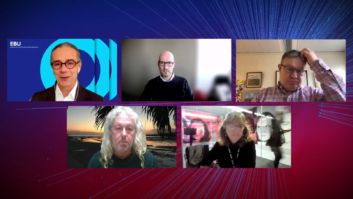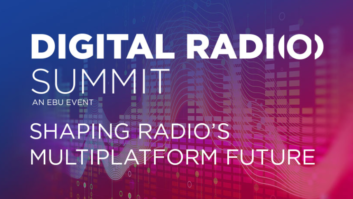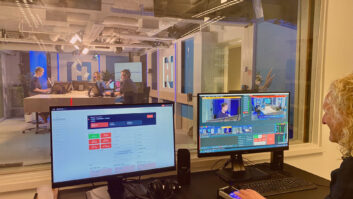The European Broadcasting Union’s Head of Radio Graham Dixon discussed what radio means in 2017 to Radiodays Europe attendees during the recent event, which took place in March. For those who weren’t able to attend this year’s conference, here is the full presentation.
AMSTERDAM — A year has passed since we met in Paris — most of us here have spent the last year working energetically to produce great content and in other ways develop this medium, which we love. And which we know so well.

EBU Head of Radio Graham Dixon addresses the audience at Radiodays Europe 2017.
However, a few months ago, a newly arrived EBU colleague asked me, “What is radio?”. It was late in the afternoon, and frankly, my answer was not so immediate to his very direct question. In the past, there was a simple answer, a box with a receiver and speaker — not now. With so many sources of audio, what is radio? We need a new definition.
The world moves quickly…. When we were in Paris, we might not have anticipated that we would enter the age of smart home devices from Amazon and Google — and these are more than devices, they are offering new channels. So any new definition cannot comment about how people listen, but rather it should focus on what radio does.
Traditionally, radio provides us with education, information and entertainment. The traditional definition is still true; in this post-truth world, access to a range of opinions and views is more important than ever. However, this definition is incomplete.
It fails to mention that radio also provides us with company, with identity and gives us a voice. Whether it occupies the public or the commercial space, radio creates a community, and creates that community by providing contact with events around us and in the wider world. More than this, radio can itself create the event, connecting people with each other and with music and ideas.
A good amount of my time is spent making the case for digital broadcasting. Sharing my Swiss apartment with a family of three delightful Amazon Echos forces me to reflect everyday on whether or why we need conventional broadcasting.
My answer is that we do. For three reasons: Security — in an uncertain world, we cannot risk hacking or shutdown precisely at the moments when we most need information. Social exclusion — the one-off payment for a radio receiver overrides the digital divide. Gatekeepers — companies controlling the platforms and choosing which content and stations should be available or prioritized for commercial reasons, or following an invisible algorithm.
I said that radio is a community, with specific societal benefits, a fact that has been recognized —after long legal disputes — by the body, which assigns internet names, ICANN. For us at the EBU, with the support of sister unions, commercial and community radio around the world, the launch of the dotRADIO domain is one of the most significant events of 2017. We are proud that this space will be made available to organizations and people genuinely working in the radio area, and we hope that it will enhance the sense of community, and the identity of radio as a medium going forward.
All of this speaks of the vitality and resilience of the radio medium, a medium adaptable to technological change because it continues to respond to basic human needs. What is radio? It is the audio-based delivery of content in response to human curiosity and the need for connection. We need to connect with others, hear their views, and express our own; and as humans, we have exceptional curiosity. Our curiosity and our need for connection have also brought us to Amsterdam. Connection and curiosity are precisely the reasons our medium exists and remains in good health.
Let’s have some great Radiodays. Let’s continue writing the next chapter of radio.











